| Srl | Item |
| 1 |
ID:
178565
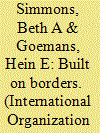

|
|
|
|
|
| Summary/Abstract |
The Liberal International Order is in crisis. While the symptoms are clear to many, the deep roots of this crisis remain obscured. We propose that the Liberal International Order is in tension with the older Sovereign Territorial Order, which is founded on territoriality and borders to create group identities, the territorial state, and the modern international system. The Liberal International Order, in contrast, privileges universality at the expense of groups and group rights. A recognition of this fundamental tension makes it possible to see that some crises that were thought to be unconnected have a common cause: the neglect of the coordinating power of borders. We sketch out new research agendas to show how this tension manifests itself in a broad range of phenomena of interest.
|
|
|
|
|
|
|
|
|
|
|
|
|
|
|
|
| 2 |
ID:
085894
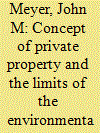

|
|
|
|
|
| Publication |
2009.
|
| Summary/Abstract |
An absolutist concept of property has the power to shape and constrain the public imagination. Libertarian theorists normatively embrace this concept. Yet its influence extends far beyond these proponents, shaping the views of an otherwise diverse array of theorists and activists. This limits the ability of environmentalists, among others, to respond coherently to challenges from property rights advocates in the U.S. I sketch an alternative concept-rooted in practice-that understands private property as necessarily embedded in social and ecological relations, rather than constrained by these relations. I argue that this concept can prefigure a more robust environmentalism.
|
|
|
|
|
|
|
|
|
|
|
|
|
|
|
|
| 3 |
ID:
061757
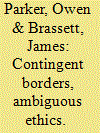

|
|
|
| 4 |
ID:
127055
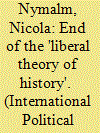

|
|
|
|
|
| Publication |
2013.
|
| Summary/Abstract |
Over the last 10 years, economic issues related to currency policy have become the major ongoing dispute between China and the United States. Specifically, the US Congress has demanded a tougher policy to avert the negative consequences of "unfair" Chinese policies-in the form of a "manipulated currency"-for the US economy. Building on an analytical framework of discourse theory (DT)-and proposing a method for applying DT in empirical research-an investigation into congressional debates on the Chinese currency shows that the question is not a purely economic one, but rather that it reflects a dislocation of US identity as the vanguard of liberal-democratic capitalism. This dislocation involves changes to how "liberal" identity in the US Congress is articulated in relation to the role attributed to "illiberal" China, which in turn affects the formulation of US China policy in Congress.
|
|
|
|
|
|
|
|
|
|
|
|
|
|
|
|
| 5 |
ID:
140282
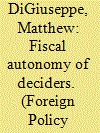

|
|
|
|
|
| Summary/Abstract |
Liberal theory claims that the constraint taxpayers impose on military expenditure is an important mechanism through which democracy and international commerce help prevent conflict. However, leaders with affordable access to sovereign credit have often overcome this constraint by raising revenue on credit markets. By minimizing or deferring the economic burden imposed on taxpayers and the macroeconomic stress associated with alternative financing strategies, I argue that these leaders have greater autonomy to pursue an aggressive foreign policy if they so desire. Leaders that lack creditor confidence risk increased political opposition and removal from office if hostilities generate macroeconomic stress or disturb the domestic fiscal balance. They also face a higher likelihood of defeat or retreat, and the subsequent political consequences, if they pursue conflict without sufficient resources. Estimates of a heteroskedastic probit model support this hypothesis and indicate that creditworthy states initiate conflict with a greater mean probability and greater variance than their noncreditworthy counterparts.
|
|
|
|
|
|
|
|
|
|
|
|
|
|
|
|
| 6 |
ID:
132097
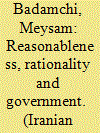

|
|
|
|
|
| Publication |
2014.
|
| Summary/Abstract |
Rawls formulates liberalism according to two conceptions of reasonable and rational, which, tied to two particular notions of society and person, define the basis of liberalism in Rawlsian thought. This article argues that Mehdi Haeri Yazdi's important work, Hekmat va Hokumaat, should be considered as a work of liberal theory, and shows how it endorses liberal conceptions of the reasonable and the rational. The main elements of Ha'eri's liberalism are his thesis that philosophy has priority over jurisprudence, his doctrine of contract based upon concepts of agency contract (aqd-e vekalat) and joint private ownership (malekiyat-e shakhsi-ye musha), and his defense of individualism against the alleged collectivism of Rousseau.
|
|
|
|
|
|
|
|
|
|
|
|
|
|
|
|